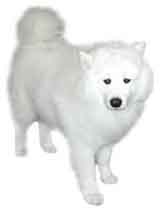Small Dog BreedsInformation About The Small German Spitz Dog Breed |
|
|
The Small German Spitz is the smaller variety of the Great German Spitz (also known as Gross Spitz). The only difference between the two is in the size. Aside from that, characteristics and conformation are the same between the two breeds. The Small German Spitz is a beautiful, happy, alert, and a very intelligent little dog. He is an excellent guard and makes a great and loyal companion. He is very affectionate with his owners and suspicious with strangers. The Small German Spitz loves to bark, particularly when left alone for too long. As with all breeds, positive training and socialization is important and should start from puppy hood. Size: The Small German Spitz stands approximately 11in at the shoulder and weighs no more than 7 ½ lb. History and origin: The history of the Small German Spitz is quite difficult to locate. Prehistoric remains of the breed have been found all over Asia and the Pacific, while drawings of similar dogs were found among the remains of the ancient Pharaohs. There are a number of Spitz varieties, all of which are very similar in character and type. In the late Sir Richard Glyn's work "Champion Dogs of the World," he made a reference to a white variety of Spitz established in German Pomerania about 160 years ago which were bred in different sizes. Some of the smallest sizes with different colors were introduced to the United Kingdom under the name of Pomeranian which became well established and was later known as the Small German Spitz. Feeding: Recommended feeding for the Small German Spitz is 1/3 - ½ can (13.3oz size) of high-quality meat product with biscuit added in equal amount or 1-1 ½ cups of complete dry food. Exercise: Although the Small German Spitz has the ability to cover immense areas at speed, he does not require a great deal of exercise and is ideal for apartment living. Grooming: The Small German Spitz has a long, dense coat that requires vigorous daily brushing to keep it in great condition.Back to the Small Dog Breed page
| |
|
Related News About Dogs ' ); // get rid of newsfeed display by carp CarpConf('poweredby',''); CarpCacheShow('http://www.small-dog-info.com/support-files/rss.xml'); ?>
|
|
|
|
|
|
Copyright © 2006-2007 dogguidance.com |


